| کد مقاله | کد نشریه | سال انتشار | مقاله انگلیسی | نسخه تمام متن |
|---|---|---|---|---|
| 2493158 | 1115474 | 2015 | 12 صفحه PDF | دانلود رایگان |
• Nicotine withdrawal is complex and involves several neurophysiological mechanisms.
• Sex, age, and genetic factors also influence responses to nicotine withdrawal.
• Animal studies have informed human studies of potential therapeutic targets.
• Emerging research will aid in development of tailored smoking cessation therapies.
Diseases associated with tobacco use constitute a major health problem worldwide. Upon cessation of tobacco use, an unpleasant withdrawal syndrome occurs in dependent individuals. Avoidance of the negative state produced by nicotine withdrawal represents a motivational component that promotes continued tobacco use and relapse after smoking cessation. With the modest success rate of currently available smoking cessation therapies, understanding mechanisms involved in the nicotine withdrawal syndrome are crucial for developing successful treatments. Animal models provide a useful tool for examining neuroadaptative mechanisms and factors influencing nicotine withdrawal, including sex, age, and genetic factors. Such research has also identified an important role for nicotinic receptor subtypes in different aspects of the nicotine withdrawal syndrome (e.g., physical vs. affective signs). In addition to nicotinic receptors, the opioid and endocannabinoid systems, various signal transduction pathways, neurotransmitters, and neuropeptides have been implicated in the nicotine withdrawal syndrome. Animal studies have informed human studies of genetic variants and potential targets for smoking cessation therapies. Overall, the available literature indicates that the nicotine withdrawal syndrome is complex, and involves a range of neurobiological mechanisms. As research in nicotine withdrawal progresses, new pharmacological options for smokers attempting to quit can be identified, and treatments with fewer side effects that are better tailored to the unique characteristics of patients may become available.This article is part of the Special Issue entitled ‘The Nicotinic Acetylcholine Receptor: From Molecular Biology to Cognition’.
Journal: Neuropharmacology - Volume 96, Part B, September 2015, Pages 223–234
